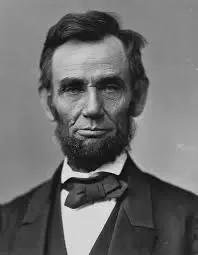Abraham Lincoln rearrange
1. Rearrange the following sentences to make a coherent order.
(i) The last words of the speech are: “Government of the people, by the people, for the people shall not perish from the earth.”
(ii) Abraham Lincoln was the President of the United States of America.
(iii) On the 10th of November 1863, a railway train was carrying him to a place called Gettysburg.
(iv) It is one of the finest and shortest speeches in English language.
(v) He was going there to speak at a meeting.
(vi) On the envelope, it was what he was going to say at the meeting.
(vii) These words tell us what the best possible way of ruling a country is.
(viii) He was not writing on a paper, but on the back of an envelope.
(ix) In the train, he was busy with writing something.
(x) In fact, the speech on the envelope is now famous as “Gettysburg Address.”
Answer-1: ii + iii + v + ix + viii + vi + x + iv + i + vii
👉Abraham Lincoln was the President of the United States of America. On the 10th of November 1863, a railway train was carrying him to a place called Gettysburg. He was going there to speak at a meeting. In the train, he was busy with writing something. He was not writing on a paper, but on the back of an envelope. On the envelope, it was what he was going to say at the meeting. In fact, the speech on the envelope is now famous as “Gettysburg Address.” It is one of the finest and shortest speeches in English language. The last words of the speech are: “Government of the people, by the people, for the people shall not perish from the earth.” These words tell us what the best possible way of ruling a country is.
অনুবাদ: আব্রাহাম লিংকন যুক্তরাষ্ট্রের প্রেসিডেন্ট ছিলেন। ১৮৬৩ সালের ১০ নভেম্বর, একটি ট্রেন তাঁকে গেটিসবার্গ নামক একটি স্থানে নিয়ে যাচ্ছিল। তিনি সেখানে এক সমাবেশে বক্তব্য রাখার জন্য যাচ্ছিলেন। ট্রেনে তিনি কিছু লেখায় ব্যস্ত ছিলেন। তিনি কোনো কাগজে নয় বরং একটি খামের পেছনে লিখছিলেন। তিনি সমাবেশে যা বলবেন তা একটি খামের ভেতর ছিল। আসলে খামের ভেতরের সেই বক্তব্যই আজ “গেটিসবার্গ অ্যাড্রেস” নামে পরিচিত। এটি ইংরেজি ভাষার অন্যতম চমৎকার ও সংক্ষিপ্ত ভাষণ। ভাষণের শেষ কথাগুলো হলো, “জনগণের দ্বারা, জনগণের জন্য , জনগণের সরকার পৃথিবী থেকে বিলুপ্ত হবে না।” এই শব্দগুলো আমাদের বলে দেয- একটি দেশ শাসনের জন্যে সম্ভাব্য সর্বোত্তম পন্থা কোনটি।
2. Rearrange the following sentences to make a coherent order.
a) During the time when he was the president of America, a civil war took place over the question of slavery.
b) He rose from humble origin.
c) As a man, he was simple and kind.
d) Lincoln was born in 1809.
e) It began in 1861 and continued for more than four years and Lincoln was in favour of the slave.
f) Abraham Lincoln was among the greatest presidents of the United States of America.
g) There were many Negro slaves in America in those days.
h) Lincoln became great by dint of his own efforts and perseverance.
Answer-2: f→d→b→c→h→g→a→e
👉Abraham Lincoln was among the greatest presidents of the United States of America. Lincoln was born in 1809. He rose from humble origin. As a man, he was simple and kind. Lincoln became great by dint of his own efforts and perseverance. There were many Negro slaves in America in those days. During the time when he was the president of America, a civil war took place over the question of slavery. It began in 1861 and continued for more than four years and Lincoln was in favour of the slave.
অনুবাদ: মার্কিন যুক্তরাষ্ট্রের শ্রেষ্ঠ রাষ্ট্রপতিদের মাঝে আব্রাহাম লিংকন অন্যতম। লিংকন ১৮০৯ সালে জন্মগ্রহণ করেন। তিনি দরিদ্র পরিবার থেকে উঠে এসেছেন। মানুষ হিসেবে তিনি ছিলেন সাধারণ ও দয়ালু। নিজের চেষ্টা ও অধ্যবসায়ের ফলেই লিংকন বিখ্যাত হয়েছিলেন। তিনি যখন আমেরিকার প্রেসিডেন্ট ছিলেন, তখন একটি গৃহযুদ্ধ সংঘটিত হয়। ১৮৬১ সালে এটি শুরু হয় এবং চার বছরেরও বেশি সময় ধরে চলতে থাকে। দাসপ্রথার প্রশ্নে সারাদেশে গৃহযুদ্ধ সংঘটিত হয়। সেসব দিনগুলোতে আমেরিকায় অনেক কৃষ্ণাঙ্গ দাস ছিল।লিংকন ছিলেন দাসদের পক্ষে।



